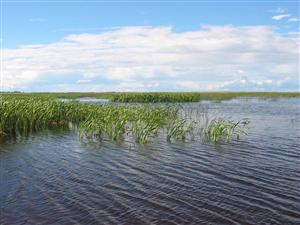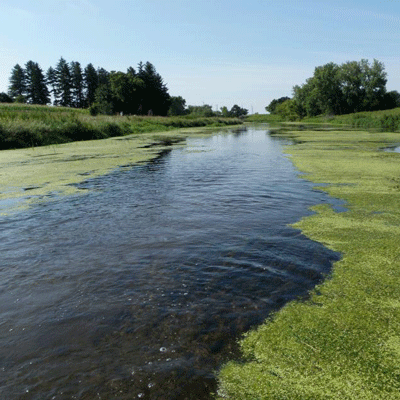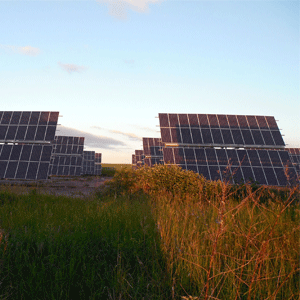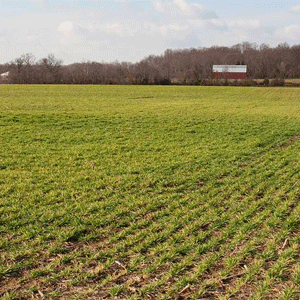|
 map credit: Stop Line 3 map credit: Stop Line 3
Native youth take the lead to protect Minnesota from pipeline
On Saturday, August 12, a team of indigenous youth will launch canoes in Itasca State Park, at the headwaters of the Mississippi, on a journey called Paddle to Protect. They’re a group on a mission to send a message to Enbridge and the State of Minnesota. That message: Line 3 attacks the rights and lives of the Ojibwe people, and it must be stopped. Paddle to Protect will travel over more than 250 miles of northern Minnesota, through wild rice waters and treaty lands that Line 3 would severely threaten.
Enbridge’s Line 3 proposal would construct an entirely new pipeline between Minnesota’s northwest corner and the Twin Ports of Duluth and Superior, nominally as a replacement to the aging Line 3 currently buried in the state. This line would pump extremely emissions-heavy oil from the Alberta tar sands through lands and waters where Ojibwe tribes maintain treaty rights to fish and harvest wild rice, which they depend on for income, health, and cultural use. A tar sands oil spill in those waters would devastate entire ecosystems. Enbridge has already begun construction on this pipeline in Manitoba and Wisconsin, encircling Minnesota, but it has yet to pass the review and permitting process our state requires.
Thanks to the efforts of youth like the Paddlers, this process has been much improved. On August 9, Governor Dayton announced that the deadline on the Environmental Impact Statement for Line 3 would be delayed to continue considering the enormous volume of comments received – more than 2,860 recorded by the Department of Commerce. And a group of youth, including some involved in Paddle to Protect, have been recognized as “intervenors,” meaning they will be able to participate in hearings and court decisions that will determine whether the pipeline will receive a permit. Thanks to these young people and indigenous-led organizations like Honor the Earth, a victory for Line 3 backers is far from a forgone conclusion.
For more information on Paddle to Protect and how Line 3 would impact Ojibwe communities, visit honorearth.organd stopline3.org/paddletoprotect, and check out the news coverage below.
Stop Line 3: Paddle to Protect campaign video
Bemidji Pioneer: Environmental activists hold concert to oppose pipelines
Star Tribune: Enbridge’s Line 3: Why 13 young Minnesotans launched a legal fight against a pipeline
Duluth News Tribune: Line 3 replacement getting spendier
MPR News: Minn. oil pipeline fight stokes threats, fears of Standing Rock
Duluth News Tribune: Line 3 environmental review release pushed back

|

|
Governor seeks your ideas for improving water quality
Governor Mark Dayton wants Minnesota to accelerate the pace of progress towards clean water. He announced a new “25 by 25” Water Quality Goal, aiming to spur collaboration and action to improve Minnesota’s water quality — 25% by the year 2025. Without additional action, the quality of Minnesota’s waters is expected to improve only 6-8% by 2034.
Governor Dayton is seeking your ideas on how to improve water quality and is hosting a series of Town Halls over the summer and fall. For info on how to get involved, click the Act Now button.
|
 |
EPA administrator stops in Fargo for closed roundtable on federal waters rule
(From Inforum) — Scott Pruitt, administrator of the U.S. Environmental Protection Agency, attended a closed-door roundtable discussion here Wednesday, Aug. 9, on the federal government’s proposed revision of the Waters of the U.S. rule, known as WOTUS. Attendees of the roundtable held at North Dakota State University included North Dakota Gov. Doug Burgum, U.S. Sen. John Hoeven and U.S. Rep. Kevin Cramer, as well as representatives of a number of farm groups. After the roundtable, Pruitt left immediately without speaking to news reporters waiting outside the meeting room. >>Read More.
|

photo credit: MPCA |
Proposed Nitrogen Rule wouldn’t do enough for Minnesota waters
The Minnesota Department of Agriculture is currently accepting public comments on its draft Nitrogen Fertilizer Rule, which aims to reduce the amount of nitrate pollution in the state’s groundwater. Nitrate contamination is a serious issue that requires a robust response, and unfortunately, the proposed rule is severely watered-down. It would fail to protect currently uncontaminated groundwater, focusing only on already-impaired waters. It would have a needlessly long 3-year phase-in period after an already 26-year wait on nitrogen standards. And the mandatory best practices it enforces fall short of any meaningful reduction of nitrogen fertilizer use. For more information, take a look at this fact sheetproduced by our friends at MCEA.
Written comments will now be accepted until August 25, 2017 – tell the MDA to adopt a rule that will actually benefit state waters!
|
 |
 |
Met Council chair: Southwest light rail work should start by 2019
(From MPR News) — The new Metropolitan Council chair hopes the transit agency will start construction on the Southwest light rail line — the agency’s most ambitious project — by early 2019. DFL Gov. Mark appointed Alene Tchourumoff as Met Council chair in June. In an interview Thursday with MPR News host Tom Weber, Tchourumoff laid out what she called a bipartisan agenda for transportation and infrastructure, including the new light rail line. By the time Dayton’s term ends in early 2019, Tschourumoff said she hopes “we will have started the construction of Southwest LRT, we’ll have sustainable funding for transit, and we will have elevated the dialogue and discussion around our convening role in water, in particular.” >>Read More.
|
 |
 |
Electric vehicles and rewewables: the PB&J of the energy world
(From MinnPost, by Fresh Energy senior policy associate Andrew Twite) — Electric vehicles and renewable energy are like peanut butter and jelly: They’re great on their own, but they’re so much better together. Electric vehicles save money and are better for the environment, and wind energy is the lowest-cost way to make electricity in Minnesota. When combined, renewable energy makes electric vehicles cleaner and cheaper, and, at the same time, electric vehicles can help integrate variable renewable electricity generation. >>Read More.
|
 |
Rural sustainability
(From The Timberjay) — The building is clean, the floors are waxed, and the vision behind a remarkable effort at rural sustainability is taking physical form as the folks behind the Orr Recreation and Resource Center prepare for their second annual Homesteading and Sustainable Lifestyles Expo, set for Aug. 19-20, in Orr. It’s been a busy year at the ORR Center, thanks to a small army of volunteers, donations, grants, and their energetic field marshal Wendy Purdy, who makes sure everything and everyone keeps moving in the right direction. Wendy and her husband Jeff were busy working at the center this week, hoping to show off some of the progress they’ve made since the last expo. Jeff was up on the expansive flat roof of the former Orr School building, which now houses the center. He’s making the final connections on an 11.8-kilowatt solar array that will provide a bit over half of the center’s electrical needs. >>Read More.
|
 |

photo credit: Chesapeake Bay Program |
Frank Family Farms honored at fair for its conservation efforts; Mower County operation uses strip tillage and more
(From Austin Daily Herald) — Farming in the headwaters of Rose Creek has presented soil-erosion challenges to the Frank family while operating 1,100 acres for corn, soybeans and hay near Dexter. “We believe a big part of being farmers is to be good stewards of what God has given us to be in charge of,” Tom Frank said. “That is not only doing our best to run a profitable, sustainable farming operation but also to care for the land.” For its efforts, Frank Family Farms is the 2017 Conservationist of the Year for Mower County as chosen by Mower Soil and Water Conservation District’s Board of Supervisors. >>Read More.
|
 |
 |
St. Louis County passes bee-friendly policy
(From Duluth News Tribune) — Minnesota’s largest county will avoid the use of neonicotinoid pesticides and will plant bee- and butterfly-friendly native plants when possible under a resolution approved by the St. Louis County board Tuesday. The board unanimously passed the resolution that calls for county actions to bolster pollinator populations “and provide the framework for pollinator-friendly policies in St. Louis County.” Scientists have linked the use of certain pesticides containing neonicotinoids and the huge decline in pollinators such as native bees, domestic honeybees and butterflies. Butterflies, especially monarchs, also are facing a habitat issue, with critically important milkweed being nudged out of rural areas by heavy use of herbicides and cropland expansion. >>Read More.
|
Upcoming Environmental Events
-
See the new film “Chasing Coral”, August 13
Davanni’s in Woodbury
Hosted by Southeast Metro Climate Action
-
Remove sumac at River Oaks Park, August 15
River Oaks Park, Cottage Grove
Hosted by Friends of the Mississippi River
-
‘Make & Take’ Rain Barrel Workshop, August 22
Dakota County Fairgrounds, Eagan
Hosted by Friends of the Mississippi River
-
Wild and Scenic Film Festival: Minneapolis, August 25
The Ritz Theater, Minneapolis
Hosted by Friends of the Boundary Waters Wilderness
-
Healthy Local Food Exhibit at the Minnesota State Fair, August 25-September 6
Minnesota State Fairgrounds, Falcon Heights
Hosted by Renewing the Countryside
-
The Energy Fair, September 9
Harriet Island Park, St. Paul
Hosted by Midwest Renewable Energy Association, featuring many MEP member groups
Jobs and Volunteer Opportunities
Director of Public Affairs | Northeast Minnesotans for Wilderness
Executive Director, Southwest | Regional Sustainable Development Partnership University of Minnesota Extension – Apply by August 21
Land Protection Specialist MN, ND, SD | The Nature Conservancy – Apply by August 24
Part-time Fellow, Energy Policy Research | Fresh Energy
Healthy Local Food Exhibit Staff | Renewing the Countryside
Forestry Policy Research Internship | Friends of the Boundary Waters Wilderness – Apply by August 18
State Policy Community Organizer | Land Stewardship Project
State Director | Environment Minnesota
See all job postings
|
|
|